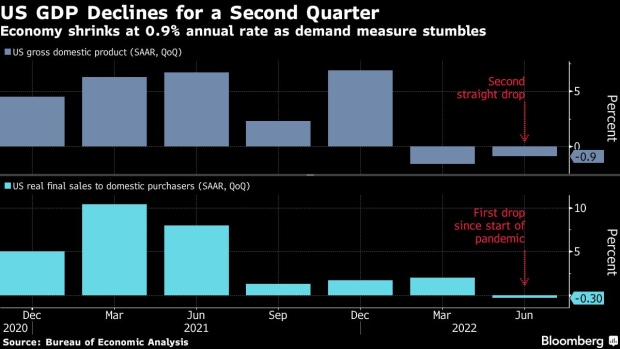Aug 2, 2022
Fed ‘Nowhere Near’ Finished With Inflation Fight, Daly Says
, Bloomberg News

(Bloomberg) -- The Federal Reserve is “nowhere near” being almost done in fighting the hottest inflation in four decades, and officials are fully committed to achieving price stability, San Francisco Fed President Mary Daly said.
“We have made good start, and I feel really pleased with where we’ve gotten to by this point,” but inflation is “far too high,” Daly said in an interview on LinkedIn Tuesday. “We are still resolute and completely united on achieving price stability, which doesn’t mean 9.1% inflation -- it means something closer to 2% inflation, so a long way to go.”
Fed officials raised interest rates by 75 basis points last week for the second straight month, the most aggressive back-to-back increase in more than a generation to tame inflation.
Chair Jerome Powell told reporters after the July 27 decision that officials could do the same again at their next meeting in September -- depending on readings from the economy between now and then -- though they would slow at some point in the future. The Fed next meets Sept. 20-21.
Daly said that the Fed has to make good on commitments to continue to raise interest rates.
“It really would be premature to unwind all of that and say the job is done,” she said. “I also think that we’ve been with this high inflation for a while, and really getting too confident that we’ve already solved the problem,” Daly said, adding that the Fed needs to “keep committed until we actually see it in the data.”
Data since the Fed decision last week showed US gross domestic product contracting for the second consecutive quarter from April to June, meeting the threshold that some economists use as a rule of thumb to judge a recession.
Last week, Powell pushed back on suggestions that the US is already in a recession.
The National Bureau of Economic Research’s business-cycle dating committee -- the official arbiter of US recessions -- does not accept this view. Instead, the group of eight elite academic economists looks at half a dozen monthly economic reports to see a “significant decline in economic activity that is spread across the economy and that lasts more than a few months.”
Many of the six indicators -- including personal incomes and nonfarm payrolls -- have performed well in recent months.
Chicago Fed President Charles Evans, Cleveland’s Loretta Mester and St. Louis’s James Bullard are also due to speak Tuesday.
(Updates with comment from Daly in sixth paragraph.)
©2022 Bloomberg L.P.





